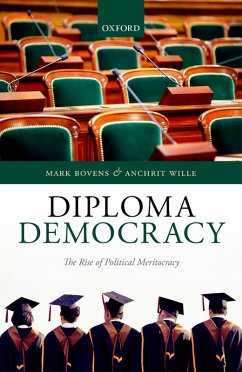Lay politics lies at the heart of democracy. Political offices are the only offices for which no formal qualifications are required. Contemporary political practices are diametrically opposed to this constitutional ideal. Most democracies in Western Europe are diploma democracies - ruled by those with the highest formal qualifications. Citizens with low or medium educational qualifications currently make up about 70 percent of the electorates, yet they have become virtually absent from almost all political arenas. University graduates have come to dominate all political institutions and venues, from political parties, parliaments and cabinets, to organised interests, deliberative settings, and Internet consultations. This rise of a political meritocracy is part of larger trend. In the information society, educational background, like class or religion, is an important source of social and political divides. Those who are well educated tend to be cosmopolitans, whereas the lesser educated citizens are more likely to be nationalists. This book documents the context, contours, and consequences of this rise of a political meritocracy. It explores the domination of higher educated citizens in political participation, civil society, and political office in Western Europe. It discusses the consequences of this rise of a political meritocracy, such as descriptive deficits, policy incongruences, biased standards, and cynicism and distrust. Also, it looks at ways to remedy, or at least mitigate, some of the negative effects of diploma democracy.
Dieser Download kann aus rechtlichen Gründen nur mit Rechnungsadresse in A, B, BG, CY, CZ, D, DK, EW, E, FIN, F, GR, HR, H, IRL, I, LT, L, LR, M, NL, PL, P, R, S, SLO, SK ausgeliefert werden.









